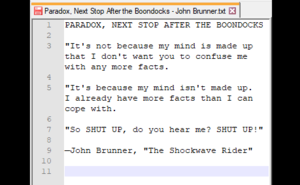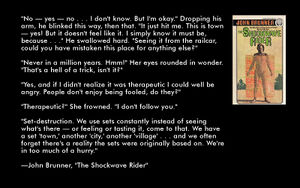The Shockwave Rider (nonfiction): Difference between revisions
(Created page with "'''''The Shockwave Rider''''' is a science fiction novel by John Brunner, originally published in 1975. It is notable for its hero's use of computer hacking skills to escape p...") |
No edit summary |
||
| (11 intermediate revisions by the same user not shown) | |||
| Line 1: | Line 1: | ||
'''''The Shockwave Rider''''' is a science fiction novel by John Brunner, originally published in 1975. It is notable for its hero's use of computer hacking skills to escape pursuit in a dystopian future, and for the coining of the word "worm" to describe a program that propagates itself through a computer network. | [[File:Paradox, Next Stop After the Boondocks - John Brunner.png|thumb|PARADOX, NEXT STOP AFTER THE BOONDOCKS / "It's not because my mind is made up that I don't want you to confuse me with any more facts. / "It's because my mind isn't made up. I already have more facts than I can cope with. / "So SHUT UP, do you hear me? SHUT UP!" —John Brunner, "The Shockwave Rider"]]'''''The Shockwave Rider''''' is a science fiction novel by John Brunner, originally published in 1975. It is notable for its hero's use of computer hacking skills to escape pursuit in a dystopian future, and for the coining of the word "worm" to describe a program that propagates itself through a computer network. | ||
== Excerpts == | |||
[[File:The Shockwave Rider - set destruction.jpg|thumb|Set-destruction.]] | |||
<blockquote> | |||
"No — yes — no . . . I don't know. But I'm okay." Dropping his arm, he blinked this way, then that. "It just hit me. This is town — yes! But it doesn't feel like it. I simply know it must be, because . . ." He swallowed hard. "Seeing it from the railcar, could you have mistaken this place for anything else?" | |||
"Never in a million years. Hmm!" Her eyes rounded in wonder. "That's a hell of a trick, isn't it?" | |||
"Yes, and if I didn't realize it was therapeutic I could well be angry. People don't enjoy being fooled, do they?" | |||
"Therapeutic?" She frowned. "I don't follow you." | |||
"Set-destruction. We use sets constantly instead of seeing what's there — or feeling or tasting it, come to that. We have a set 'town,' another 'city,' another 'village' . . . and we often forget there's a reality the sets were originally based on. We're in too much of a hurry." | |||
</blockquote> | |||
== In the News == | == In the News == | ||
| Line 12: | Line 26: | ||
== Nonfiction cross-reference == | == Nonfiction cross-reference == | ||
* [[John Brunner (nonfiction)]] | |||
== External links == | == External links == | ||
| Line 17: | Line 33: | ||
* [https://en.wikipedia.org/wiki/The_Shockwave_Rider The Shockwave rider] @ Wikipedia | * [https://en.wikipedia.org/wiki/The_Shockwave_Rider The Shockwave rider] @ Wikipedia | ||
== | === Social media === | ||
* [https://twitter.com/GnomonChronicl1/status/1569336803995406345 Post] @ Twitter (12 September 2022) - Paradox, Next Stop After the Boondocks | |||
[[Category:Nonfiction (nonfiction)]] | [[Category:Nonfiction (nonfiction)]] | ||
{{Template:Categories: The Shockwave Rider}} | |||
Latest revision as of 10:07, 21 September 2023
The Shockwave Rider is a science fiction novel by John Brunner, originally published in 1975. It is notable for its hero's use of computer hacking skills to escape pursuit in a dystopian future, and for the coining of the word "worm" to describe a program that propagates itself through a computer network.
Excerpts
"No — yes — no . . . I don't know. But I'm okay." Dropping his arm, he blinked this way, then that. "It just hit me. This is town — yes! But it doesn't feel like it. I simply know it must be, because . . ." He swallowed hard. "Seeing it from the railcar, could you have mistaken this place for anything else?"
"Never in a million years. Hmm!" Her eyes rounded in wonder. "That's a hell of a trick, isn't it?"
"Yes, and if I didn't realize it was therapeutic I could well be angry. People don't enjoy being fooled, do they?"
"Therapeutic?" She frowned. "I don't follow you."
"Set-destruction. We use sets constantly instead of seeing what's there — or feeling or tasting it, come to that. We have a set 'town,' another 'city,' another 'village' . . . and we often forget there's a reality the sets were originally based on. We're in too much of a hurry."
In the News
Fiction cross-reference
Nonfiction cross-reference
External links
- The Shockwave rider @ Wikipedia
Social media
- Post @ Twitter (12 September 2022) - Paradox, Next Stop After the Boondocks

